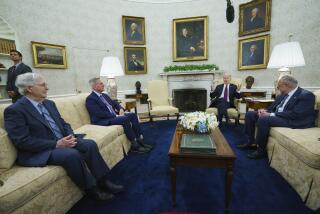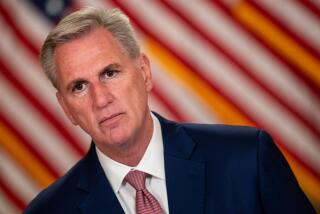Clinton, GOP Congress Get New Chance for Consensus
WASHINGTON — Two years ago, on a frosty morning after the cataclysmic congressional election of 1994, President Clinton and Newt Gingrich, the leader of Congress’ insurgent Republicans, solemnly promised to work toward joint solutions to the nation’s problems.
They didn’t mean it. Clinton and Gingrich found little common ground, and the ensuing session of Congress turned into a wild ride of budget gridlock and bitter invective.
This week, though, the voters gave Clinton and the Republican Congress a second chance to make divided government work. And once again, leaders on both sides promised solemnly to abandon partisan politics and cooperate in the nation’s interest.
“We’re moving in the right direction,” Clinton said Wednesday. “If we can somehow re-create for the next four years the spirit that prevailed” when Republicans and Democrats worked together, “we can do great things.”
“There’s no reason that we can’t find common ground,” Gingrich told reporters in his home district in Georgia.
And this time, the story could have a happier ending.
“There are only two possibilities for the next two years: consensus or gridlock,” said William Galston, a former top Clinton advisor. “But there are strong incentives now for both sides to reach consensus on issues where the public wants action.”
Democrats and Republicans alike say they have learned their lessons from the defeats of 1994 and 1996: The voters want middle-of-the-road action, not posturing and gridlock.
Both sides have trimmed their ambitions. Clinton has abandoned the grand plans for a new model of government activism that drove his first administration; his proposals now are modest, constrained by his promise to balance the budget in six more years. Gingrich and his colleagues no longer talk about a Republican “revolution”; their goal now is to hold Clinton to his balanced-budget commitment and shake the perception of many voters that their agenda was extreme.
Early signs were encouraging. On Tuesday, even as voters were still at the polls, White House officials and Republican leaders quietly telephoned each other to talk about the weeks ahead. One result was the unanimous chorus of GOP figures, from Gingrich to House Majority Leader Dick Armey (R-Texas) and Senate Majority Leader Trent Lott (R-Miss.), all talking about their desire to cooperate with Clinton.
Still, the search for common ground faces three daunting tests that will dominate the political struggle of the next two years: the budget, the Medicare crisis and the “Clinton investigations”--the list of issues from Whitewater to campaign contributions that have prompted inquests by Congress or independent counsels.
Any one of those three tests could shatter the fragile entente between the White House and Congress. And even if both sides genuinely seek progress, there will inevitably be bumps along the way.
“This may be a two-stage process,” Galston said. “Early on, some Republicans in Congress may not want to cooperate. I would expect some retribution, even blood-letting, over issues the president used against them in the campaign.”
But over time--as members of Congress focus on their next midterm election in 1998--”the incentives to cooperate will increase,” he said.
The budget will be the centerpiece, officials on both sides predicted.
This year, both Clinton and Republican leaders offered plans to balance the budget by 2002. But they differed widely on where to cut spending and what kind of tax cuts to seek. So Congress and Clinton battled to compromise on a series of appropriations bills that included larger spending cuts than the president initially proposed, but smaller than the GOP wanted.
Next year’s budget battle will determine the fate of many of the promises Clinton made during his campaign.
“Most of our agenda . . . is tied up in the budget plan,” Bruce Reed, a senior domestic policy advisor, noted.
Among Clinton’s proposals: A new $10,000 tax deduction and a $1,500 tax credit to cover the cost of college tuition. A $2-billion-per-year program to provide health insurance for six months to the temporarily unemployed. A new tax credit to encourage private businesses to hire people on welfare, at a cost of perhaps $3 billion a year--one of the “fixes” Clinton has promised for the controversial welfare reform bill he signed into law last summer.
White House advisor Reed said he believes that Republicans could support all those proposals “if they would put partisan politics aside.”
But other administration officials are skeptical, particularly of the welfare plan.
The reason: Clinton says he is still committed to a balanced budget by 2002--so all those new spending proposals, however modest, require cutting something else. This year’s Clinton budget proposal, for example, found some savings by cutting defense spending more than most Republicans were willing to accept. The next Clinton proposal is likely to do the same, officials said, setting up a major battle.
Some of the president’s other campaign promises won’t cost taxpayer money, and so might sail through Congress more easily. His proposal to expand the circumstances under which businesses would be required to grant time off to employees under the popular Family and Medical Leave Act won’t affect the budget, for example (although some businesses say it would impose a cost on them).
And some Clinton promises don’t call for any federal action at all--his calls for such local measures as school uniforms and curfews for teenagers, for example.
A second major test for the two parties’ new comity is Medicare: Who will shoulder the responsibility for reining in the cost of senior citizens’ health care?
Clinton and the Republicans agree that Medicare spending is increasing too fast; both have proposed measures to restrain the trend. But Clinton and other Democrats enraged Republicans by campaigning--successfully--on the charge that the GOP proposals were “cuts” that could “wreck” the health insurance plan.
White House officials say the president plans to propose a short-term fix to prevent Medicare’s hospital trust fund, called Part A, from running out of money in 2001. After that, they say, Clinton will propose bucking the more difficult job of long-term structural change in Medicare to a bipartisan commission--a strategy intended to lift the issue above partisan politics, but also to insulate the administration from the wrath of senior citizens who thought their health insurance would never be touched.
Will the GOP play along? Yes, said George Stephanopoulos, a senior Clinton advisor.
“The Republicans have a huge interest in getting Medicare off the table,” he said. “They don’t want to go on being the party of Medicare for the next decade.”
Not necessarily, said Galston. “The Republicans are going to resist fiddling around at the margin. They’ll want to force him to address the long-term issues--to stick him with the same issue he stuck them with.”
The third test of bipartisan cooperation--and the wild card--is the Clinton investigations: How hard will Republicans push their probes of the president’s campaign fund-raising and other issues, and will those battles poison the rest of the nation’s business?
Lott told reporters Wednesday that he wants to hold congressional hearings on the Democratic National Committee’s receipt of contributions from foreign citizens and corporations, some of which may not have been legal.
Lott said he wants the hearings to cover labor union expenditures for Democrats as well--but ducked the question of whether corporate donations to the Republican National Committee also deserved scrutiny.
But Lott said Congress should eventually turn the issue over to an independent counsel.
“We have a responsibility in a variety of ways to take a look at the allegations . . . but that is not going to be our principal focus,” he said.
That idea appeared part of an overall GOP move to rely on independent counsels to pursue the charges against Clinton, thus freeing Congress to take the high road.
Sen. Alfonse M. D’Amato (R-N.Y.), who chaired a special Whitewater committee that questioned the conduct of the president and First Lady Hillary Rodham Clinton, said Wednesday that Congress should get out of the investigation business.
“It seems to me we should leave that in the hands of the special prosecutor and not be attempting to substitute our judgment,” D’Amato told a news conference.
D’Amato said he too has joined the party of bipartisan good cheer.
“Our job is to work in common toward the goals that the president has articulated during the campaign, many of which are goals that Republicans have been fighting for,” he said.
(BEGIN TEXT OF INFOBOX / INFOGRAPHIC)
Dollars Per Vote
On a per vote basis, President Clinton spent less money than his two main opponents:
*--*
Approximate Popular vote He spent cost per vote Clinton 45,557,228 (49%) $112 million $2.46 Dole 37,841,817 (41%) $116 million $3.06 Perot 7,862,865 (8%) $37 million $4.70
*--*
Source: Associated Press
More to Read
Get the L.A. Times Politics newsletter
Deeply reported insights into legislation, politics and policy from Sacramento, Washington and beyond. In your inbox three times per week.
You may occasionally receive promotional content from the Los Angeles Times.











